- Home
- Laura Anne Gilman
An Interrupted Cry
An Interrupted Cry Read online
An Interrupted Cry
Sylvan Investigations #4
Laura Anne Gilman
www.bookviewcafe.com
Book View Café Edition
March 8, 2016
ISBN: 978-1-61138-597-7
Copyright © 2016 Laura Anne Gilman
Interior Design (eBook): April Steenburgh
Cover Design © 2015 Tiara Lynn Agresta
I scowled at the filing cabinet, a finger poking into the too—full drawers. We needed to order another one. Maybe two.
Being a PI has a lot in common with being a cop—mainly, that paperwork is the worst part of the job. Getting shot falls to second place only because paperwork happens with depressing regularity and so far—despite what certain people who will remain Wren Valere like to claim—getting shot doesn’t.
But despite the folder of receipts and reports on my desk, I was in a reasonably good mood.
I’d cracked open the office’s sole window—one of the few advantages of renting space in an older building—and the faint noise from the street and the occasional wing-flurry of one of the pigeons who insisted on roosting on the ledge had a lot to do with that mood. New York City—my favorite place in the world eleven months of the year—becomes a heat sink in August, refusing to cool down even at midnight, and the air— let’s just say that heat, humidity and subways aren’t a good combination. Even in September, you can feel the lingering layabouts, like the heat was so lazy it couldn’t be bothered to get up and move. But with October’s arrival, that last taint of too-warm had fallen to cooler nights, and a crisp upper-60’s was the renewed daytime normal.
Climate change would probably screw that up too, but for now, as the sun slipped behind the western line of skyscrapers and I had to turn on the overhead lights to keep working, my mood was all about counting blessings.
It didn’t hurt that we’d wrapped up the last case with a win: an eleven-year-old girl, reported missing nearly a week before. We’d found her chilling with a colony of kitsune near Saranac Lake and brought her—reluctantly, with complaints every mile of the way—back to the arms of her distraught (and utterly clueless) parents.
If I had a dime for every teen who went walkabout for fairy lights and fatae glamour…. Actually, I charge considerably more than a dime. But keeping them home after is their parents’ problem, not mine. I’m a PI, not a babysitter.
I tapped the paperwork, thinking about the case. Once, missing kids’d been my breadand butter—twice over when my fatae cousins were involved. But the past year or so, Ellen and I’d been hip-deep in cases where Ellen had gotten a vision of someone in dire and immediate likelihood of death, and we were the only ones who knew about it.
Not only did those cases tend to end messier, it was rare anyone actually paid us, after. We needed more bread-and-butter, much as the thought of wishing ill on anyone sat badly on my overdeveloped conscience, thanks mom. Not just for the money, though—watching Ellen’s face when we reunited kid with parents had reminded me how damn young my protégée/assistant/partner was, and the toll this job was taking on her.
It made my stomach hurt when I thought about it. She was a storm-seer, a scary-powerful Talent, and there had to be a better way for her to make a living than this. Between her mentor and my contacts, we should be able to find something….
And that thought was followed by the same one that always followed it: Ellen would kick my ass for daring to decide what was good or right for her. She was solid muscle, that kid, and no respect whatsoever for her elders. Anyway, actively doing something gave her a way to deal with the visions, according to Valere, and who was I to get in the way of someone’s demon-slaying?
Metaphorical, that was. I’d nothing against the one demon I’d met, and it would be hypocritical at best for me to go on a humancentric rant, considering my own genetics.
“Fuck it. She’s a grown-ass adult, mostly. And we’re definitely going to need another filing cabinet.”
I managed to wedge the folder into the appropriate drawer without mangling it or the surrounding files too badly. “Small victories, Hendrickson. One more pile and then there’s a cold beer in the fridge with your name on it.”
Of course, because fuck my life, that was when the lights went out. All the lights. I got to my feet and pushed open the door between my office and the front room to confirm that yeah, those lights were out, too, and the coffee maker’s ever-ready red light had gone out.
Going back into my office, I checked and, sure enough, my phone and laptop were no longer charging, and a quick glance out the window showed me that the buildings across the street were showing only the dim red light of emergency signs. I was too high up to see if the traffic lights and street lamps had also gone off, but I had a pretty good guess as to what the answer might be.
Blackout.
I sighed, thankful that there hadn’t been a power surge in the building that blew up my laptop again. That shit got old, fast. “So who did what now?”
When you work closely with Talent, the human portion of the Cosa Nostradamus, the assumption that a power outage was caused by somebody screwing up and pulling too much power from the grid was the immediate, logical, and usually correct assumption. Usually followed by mocking rights for everyone else of the hapless—and deeply embarrassed—Talent in question.
What’s particularly annoying, though, is that Talent—because the magical energy they called current made it difficult for them to use most electric-powered machines—are the least affected by things like power outages.
The rest of us mere mortals? We needed our computers, damn it. And our coffee machines.
Fortunately for me, my paternal genetic inheritance had some benefits, including the ability to see better than humans in the dark. Despite the shadow-on-shadow now filling the office, I grabbed my cell phone off the windowsill without fumbling it, unplugging it from the now—useless cord, and called one of the three landlines I had in my address book.
“Wasn’t me.” Ellen was less defensive than resigned, as though of course that would be the first thing I’d ask her.
“If it was, would you admit it?” She might have done it, easily enough: Ellen was not only a storm-seer, she was one of the strongest Talents in the City, second or third only to the other numbers I had in my address book. That fact would freak me out if I ever let myself really think about it.
A low laugh. “Not a chance in hell.” Fair enough: I gave her enough shit when she shorted out just the office, couple-three months ago.
“Well, Valere’s out of town, so we can’t blame her, unless the blackout’s spread up and down the East Coast?” The last time that had happened it was 2003, and had been caused by a group of Talents in Ohio playing an incredibly stupid game of Chicken.
“Not like I have a TV to check the news,” she reminded me.
I looked up at the shadowed ceiling for patience. “So ask around!”
“Oh.” There was an abashed silence, then, “Iggy says it’s lights-on in Boston. Ditto Lu in Philadelphia.”
Talent, in addition to being able to manipulate current to do things the rest of us can’t, can use that to ‘ping’ each other at long distance. It’s not telepathy, they insist, but if it walks like telepathy and quacks like telepathy, in my book, it deserves some Hoisin sauce.
“Just us then. Yay. And it’s past sundown. It’s ConEd, don’t expect them to get shit fixed any time soon. How’re you set for power?”
“I’m…….okay.” I could hear the hesitation in her voice, though.
“Damn it, Shadow, even I know—”
“I know, grandma, I know.” She cut me off, and I grinned, secure that she couldn’t see my amusement. The girl I’d first met would have hidden u
nder the desk when scolded, not sassed me back.
“All right, I’ll pretend you’re all grown up and can take care of yourself. Get some sleep, and hopefully they’ll have figured it out by morning.”
Talent might not suffer the lack of televisions and computers tonight, but they had one significant weakness in a blackout: they couldn’t top off their core of current in an emergency. Lacking a man-made source, the only other ways to replenish current were ley lines or an electrical storm. While there were ley lines aplenty deep in the bedrock of New York, they were—I was told, tricky to reach. And autumn wasn’t an ideal time to look for thunderstorms.
No, every wise Talent in the area would be curling up on the sofa tonight, staying out of trouble. And the unwise ones? Well, those weren’t my problem. Not until after the fact, anyway.
Unfortunately for the rest of us, it was still work as usual tonight. Mainly because the subway lines would be a mess, too, and the thought of trying to find a cab home tonight, or walking the whole way, didn’t appeal at all.
So I was stuck, at least for a few hours. I let out a sigh, and picked up the next case file, figuring I might as well finish the filing, so I could ignore it again for another month or three. But, fatae genetics or no, my eyes weren’t quite dark-sensitive enough to read the writing on the label. I reached into the lower desk drawer and pulled out a thick white candle in a glass holder, the kind they sell apportioned to various saints, and used the lighter next to it to bring a little light to the situation.
“Fortune favors the prepared, yeah?” Holding the folder close to the candle revealed the name. “All right, finally paid in full, Mr. Belkin, you now go in the drawer of honor.
“A lesser man would have made his junior partner do this,” I told the folder. “But then you’d end up god knows where and I’d never find you again.”
Ellen was getting there as an investigator, and I trusted her to have my back, but the girl couldn’t file to save her life, or mine. My mother had been career Navy, and more than a few of her neatnik habits had stuck. As much as I hated filing, I liked everything to have its own place, and for everything to be in that place when I looked for it.
But as I turned back to the filing cabinet, I paused. I’d my share of horror movies watched too young and too late at night, and in my years I’d seen shit that should have stolen my sleep, but I don’t creep out easily. Yeah, knowing the entire city had gone dark was unnerving, if you let it, but—
Something. Not quite the corner of my eye, maybe just beyond that, but something enough to make me jerk to a halt, tilt my head, feel prickles of something uncanny on my skin.
The flash of light could have been anything. It could have been a flashlight, or a candle, or a camping lantern brought into the building by some paranoid, prepared bastard. It was probably some other poor bastard stuck in their office, trying to get work done despite the circumstances.
The prickle on my skin said otherwise, and I moved to the window, Academy training and experience keeping me to the side, rather than full-on in front of the pane.
Our building wasn’t a flat square: it was shaped like a U, with a skinny courtyard in the middle, so that more offices could claim to have windows. Directly across the courtyard, maybe fifteen feet away, there was a flicker of….
No, it wasn’t light. Not from a candle or a flashlight or any other emergency illumination system I’d ever seen, anyway. It was, lacking any other term, creepy as fuck, bog-orange and too dim to be useful, like one of those fish you only ever see on deep water nature shows or something. Elongated, narrow, and then it flicked out of sight not like it had been turned off but like it’d……turned sideways and was too skinny to see?
I might ignore my non-human inheritance most of the time, but when it’s howling at me like a bansídhe on steroids, I listen. That wasn’t someone over there, that was some thing.
That should have been the end of it; my mother hadn’t raised an idiot. You don’t go poking your nose into things not your business just because you’re curious, and seeing as how more than half my neighbors would call me a thing, too, if they’d got a close look at my hooves or horns, well, I wasn’t going to assume anything. Not my business, not as a PI, not as an ex-cop, not as a concerned citizen.
Not until a second figure—human-shaped—walked in front of the window—and then fell, as though he’d been taken out by a blow to the knees.
“Ah, goddamnit.” Now I didn’t have a choice.
oOo
I wasn’t a cop for very long before HR changes forced me out, but they trained us well back then, and the muscle memory stuck. My brain was calculating time and distance to the other side of the building even as I unlocked the middle drawer that held my gun and ammo. I tried not to rely on guns—there are some things lead or silver bullets can’t kill—but a bullet slows even them down more than a bit, if you’re a good shot.
I loaded up, shoved my phone in my jeans pocket, and didn’t bother with the penlight stashed next to the ammo box: I didn’t want whatever the thing was to get advance warning it had been seen. Hopefully, my own night vision would be up to the task.
I kept the gun in my left hand, down low by my thigh and out of sight in case anyone I shouldn’t be shooting was gossiping in the hallway. There were a few open doors as I moved down the hallway, other tenants trying to wait out the subway halt, or just taking advantage of the quiet, or—in at least one office—having a relatively quiet blackout party, complete with off-tune guitar and, I was betting, at least one six-pack of beer.
I’d rather have been hanging out with them. Or back in my office, oblivious to everything — but my skin was still prickling, and the image of a body falling was too-sharp in my memory. I wondered briefly if I should be calling for backup, but the day I couldn’t poke my nose into an office in my own damn building without help was the day I’d buy a grove somewhere and retire.
The elevator was an obvious no-go, so I took the stairs, wincing at the unavoidable clatter of my boot heels on the metal risers. The emergency lights were brighter here than in the hallway, but they reflected in unpleasant ways, and I wondered if they had to be that particular shade of red. Five turns down to the lobby, leaving me a little dizzier than I liked, and I had no idea how full humans would even be able to manage in an emergency.
The lobby had yellow lights, not red. I blinked twice, adjusting.
The night guard building management had finally gotten around to hiring looked up from the security desk, saw it was me, and then went back to his tablet, the wavering white light from the screen illuminating his face almost too brightly. Nice to see he was earning his paycheck. Bastard was gonna be pissed if his battery died before the power came back on.
I considered alerting him, realized I had no idea what I’d be alerting him to, or how I’d even explain it to him. “I saw a light that couldn’t exist, and someone falling in a way that looked suspicious?” Not enough cause to call 911, even with my creds. And if that light was fatae-related? Hauling in the blues seemed like a bad idea. There were a handful of people left at the NYPD who knew what I was, a few dozen more who knew about the Cosa Nostradamus itself, but short of an all-out clusterfuck, there was no need to bring them into this. I’d spent too many years socking away favors and goodwill to waste it here and now.
I left the guard to his reading, and hotfooted across the lobby to the other stairwell and up the stars again, this time trying to move more quietly. When I reached the fourth floor, where I’d seen the odd light flash, I paused with the fire door barely cracked open, listening.
Nothing. Not only the absence of people but the muted echo of a building that had gone dead. It was unnerving, once you paid attention to it. New York City wasn’t supposed to be this quiet, ever.
As though on cue, a siren went by, five stories below, fire truck and a police car as a chaser, proof that even in a blackout, some things keep going. That probably shouldn’t have been so reassuring. I used the distant wails to
cover the sound of me moving down the hallway, mentally counting doorways until I reached what I hoped to hell was the right office. The doors here were the same as on my side: a beat-up dark wooden frame with a frosted glass inset. Where my office had letting on the glass, this one had a small sign by the side on the door, but the lettering was unreadable in the red-lit gloom.
Not that it mattered what they were selling, inside.
The door was slightly ajar. Any other day that could be a warning sign - you didn’t leave your door open, where anyone might walk in. During a blackout, it could just be someone’d done what I had—poked their nose out to see if everyone was affected, and forgot to close it again. With what I’d — maybe — seen inside, I took it as a warning sign. Gun raised to firing angle, finger sliding up the trigger guard, I pushed the door further open with my right, turning sideways to present a smaller target.
Nothing jumped out at me, nothing swung or fired or otherwise attacked. I paused, always the longest heartbeat, waiting, but nothing moved deeper in the gloom of the office. I stepped inside the doorway, glancing around, but didn’t see anything in the main room except standard office furniture, a desk and two chairs more comfortable-looking than ours, and what looked like a pile of….
I stopped and, lowering my gun but keeping my finger on the ready, stepped closer, cautiously, to the pile.
My sharp exhale of relief was too loud in the gloom-filled room. Laundry. Specifically, a laundry sack, the off-white canvas kind you dropped off at the laundromat so they could wash your unmentionables for you. I’d never been that wealthy or that lazy, but I’d dated a girl once who swore by it.
I looked up again, and my relief disappeared. Just beyond the duffle-sized sack, face down on the tile floor, one hand out flung as though to stop his fall……yeah, there was my dead body.

 West Winds' Fool and Other Stories of the Devil's West
West Winds' Fool and Other Stories of the Devil's West Gabriel's Road
Gabriel's Road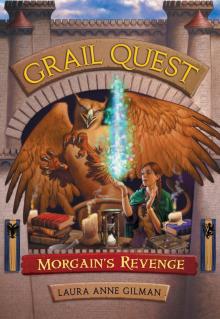 Morgain's Revenge
Morgain's Revenge The Shattered Vine
The Shattered Vine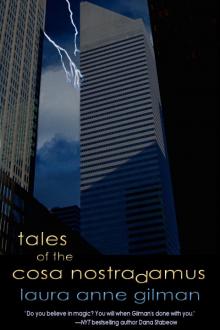 Laura Anne Gilman - Tales of the Cosa Nostradamus
Laura Anne Gilman - Tales of the Cosa Nostradamus The Camelot Spell
The Camelot Spell VISITORS
VISITORS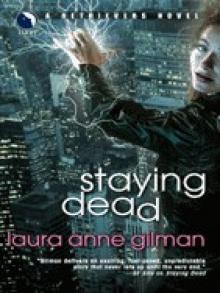 Staying Dead
Staying Dead Silver on the Road
Silver on the Road Weight of Stone
Weight of Stone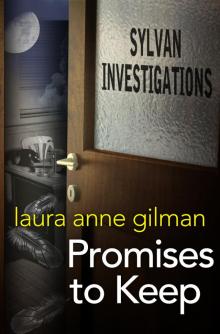 Promises to Keep
Promises to Keep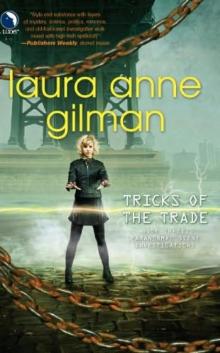 Tricks of the Trade psi-3
Tricks of the Trade psi-3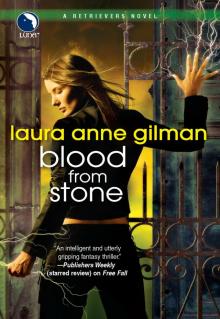 Blood from Stone
Blood from Stone Soul of Fire tp-2
Soul of Fire tp-2![Pack of Lies [2] Read online](http://i1.bookreadfree.com/i1/04/01/pack_of_lies_2_preview.jpg) Pack of Lies [2]
Pack of Lies [2] Burning Bridges
Burning Bridges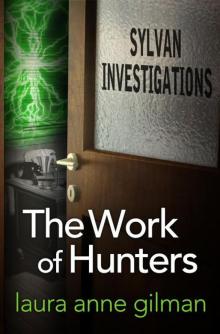 The Work of Hunters
The Work of Hunters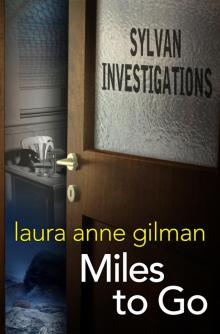 Miles to Go
Miles to Go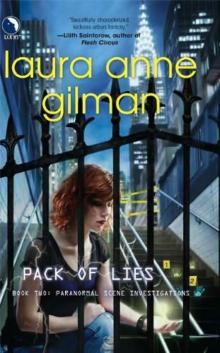 Pack of Lies psi-2
Pack of Lies psi-2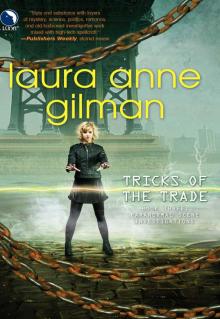 Tricks of the Trade
Tricks of the Trade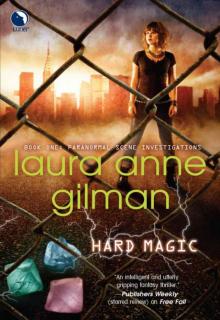 Hard Magic
Hard Magic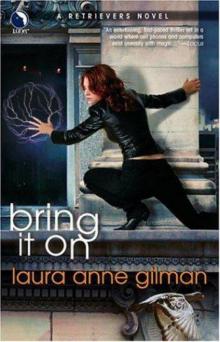 Bring It On
Bring It On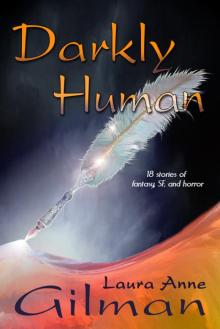 Darkly Human
Darkly Human The Cold Eye
The Cold Eye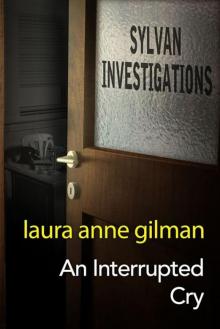 An Interrupted Cry
An Interrupted Cry Soul of Fire
Soul of Fire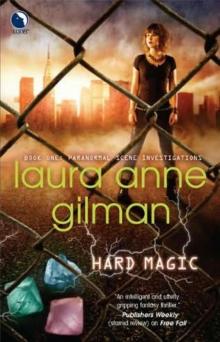 Hard Magic psi-1
Hard Magic psi-1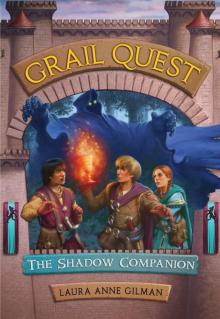 The Shadow Companion
The Shadow Companion Flesh and Fire
Flesh and Fire